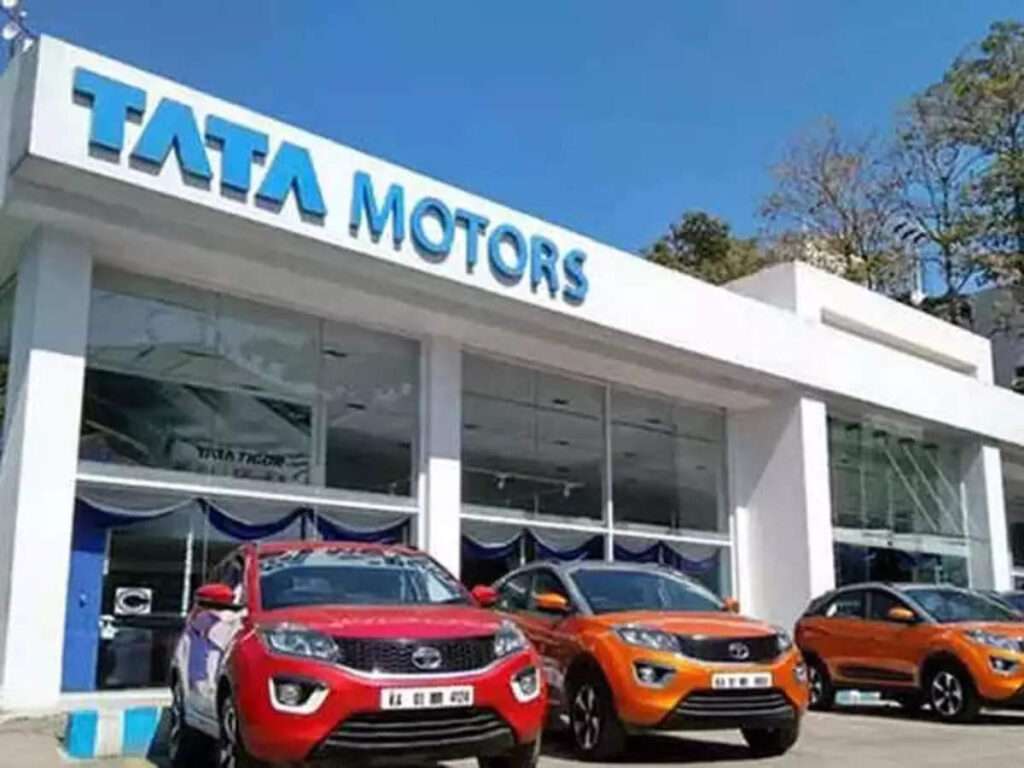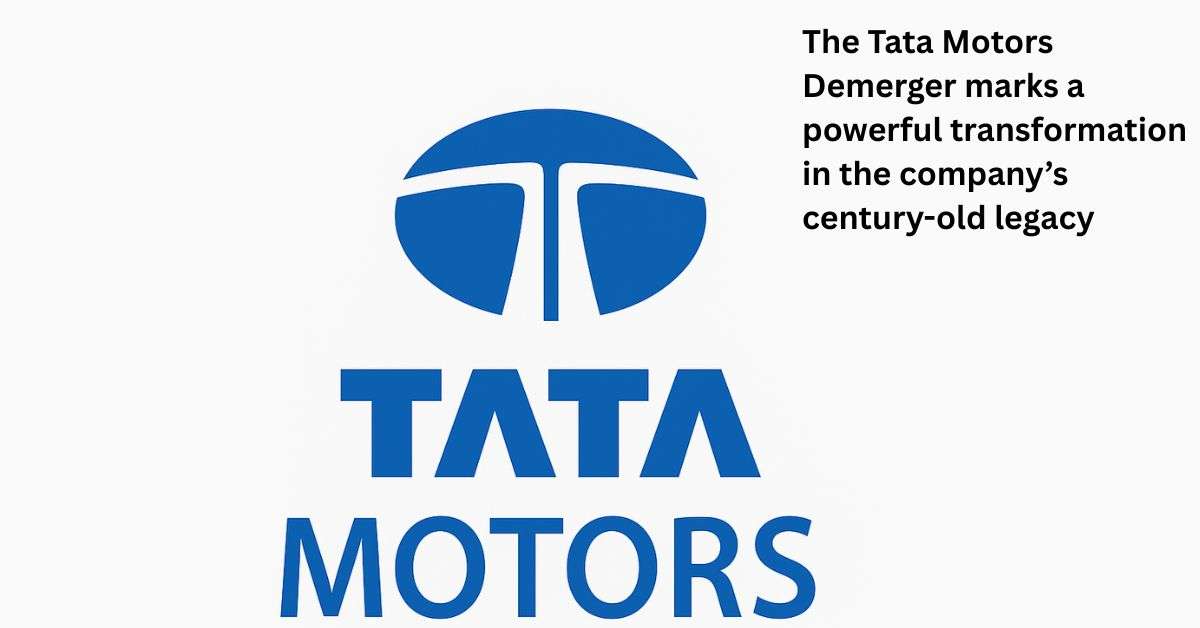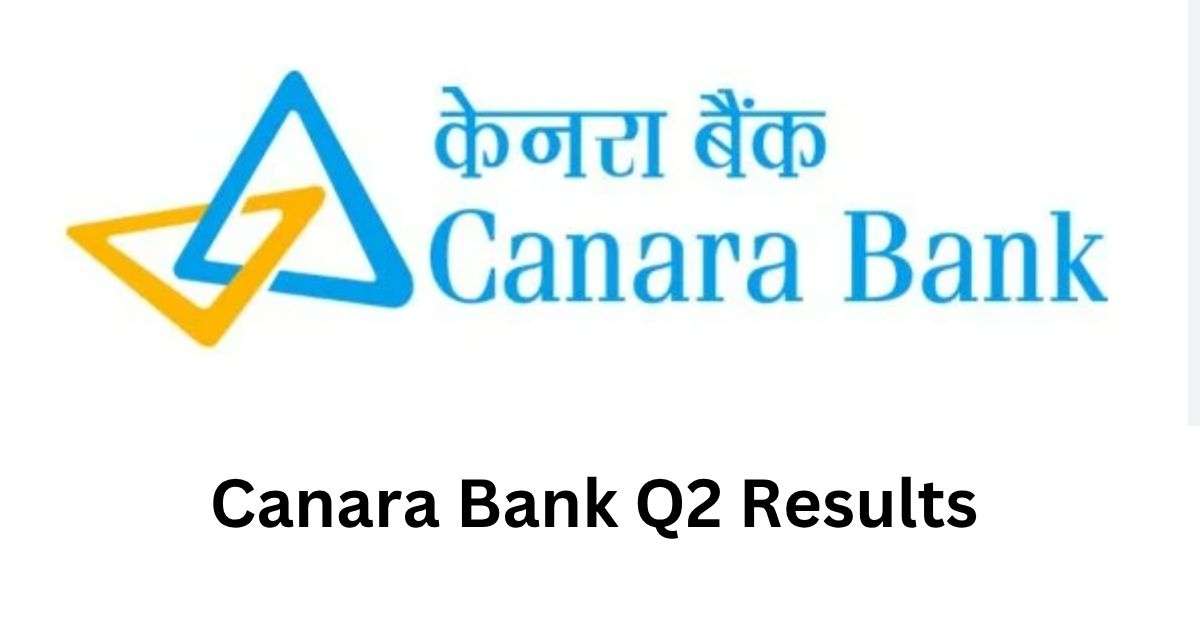Tata Motors Demerger reaches completion as the auto giant splits into two independent entities — Tata Motors Ltd (Commercial Vehicles) and Tata Motors Passenger Vehicles Ltd (TMPV). Discover listing details, valuation insights, and what this major corporate restructuring means for investors.

Tata Motors Demerger Takes Final Shape: A Transformative Step for India’s Auto Giant
The Tata Motors Demerger has finally taken its full and final shape, marking a historic milestone in India’s automobile sector. This powerful corporate move has officially split the iconic automaker into two separate and focused entities — one catering to Commercial Vehicles (CV) and the other to Passenger Vehicles (PV), including electric mobility. The development signals a bold and strategic effort to unlock shareholder value, sharpen business focus, and strengthen Tata Motors’ leadership across diverse vehicle segments.
New Corporate Structure Post-Demerger
In the final phase of the Tata Motors Demerger, the company confirmed that its commercial vehicles arm, TML Commercial Vehicles Ltd, has been officially renamed Tata Motors Ltd. This name change was formalized through a fresh Certificate of Incorporation issued on October 29, 2025, according to a regulatory filing by the company.
Earlier, on October 13, 2025, the original Tata Motors was renamed Tata Motors Passenger Vehicles Ltd (TMPV) as part of the same demerger scheme. This rebranding ensures that both businesses now operate independently, each with its unique growth strategy, leadership, and product focus.
Effective and Record Dates of Tata Motors Demerger
The Tata Motors Demerger officially took effect on October 1, 2025, with the record date set as October 14, 2025. Under the terms of the demerger, shareholders registered on the record date received one share of Tata Motors Commercial Vehicles Ltd for every one share held in Tata Motors Ltd.
This means investors now hold parallel shares in both Tata Motors Passenger Vehicles Ltd (TMPV) and Tata Motors Ltd (Commercial Vehicles) — a clear reflection of Tata Group’s commitment to fair value distribution and transparent corporate restructuring.
Business Focus: Clarity and Independence
The newly formed Tata Motors Ltd will now concentrate exclusively on the commercial vehicle business, encompassing trucks, buses, construction vehicles, and fleet mobility solutions. With over 37% domestic market share, Tata Motors continues to dominate India’s CV segment while maintaining a growing international presence through joint ventures and strategic stakes, including one in the Iveco Group.
Meanwhile, Tata Motors Passenger Vehicles Ltd (TMPV) will focus on the passenger vehicle and electric mobility businesses. The company aims to leverage its market-leading position in India’s EV space, powered by its popular Tata.ev brand. TMPV’s portfolio now includes a strong lineup of electric and internal combustion engine (ICE) vehicles, designed to meet evolving consumer needs.
Listing and Valuation: A Positive Market Outlook
The listing of the two independent entities is expected to take place in November 2025, and market analysts are closely watching how both stocks will perform post-separation.
On October 14, 2025, the Tata Motors Passenger Vehicles (TMPV) share was discovered at ₹400 per share on the NSE, compared to the pre-demerger closing price of ₹660.75. This effectively implies a residual valuation of around ₹260.75 per share for Tata Motors Ltd (Commercial Vehicles).
Leading brokerage firms have provided their valuation assessments for the two entities:
- Nomura: TMPV valued at ₹367 per share; Tata Motors (CV) at ₹365 per share.
- Mehta Equities (Prashanth Tapse): Tata Motors standalone value estimated at around ₹400 per share.
These valuations reflect investor optimism and reinforce that the Tata Motors Demerger could unlock substantial shareholder value in the medium to long term.
Strategic Rationale Behind the Tata Motors Demerger
The Tata Motors Demerger was designed to simplify the company’s structure and provide sharper strategic direction for each business. The passenger vehicle and commercial vehicle divisions have very different capital requirements, product cycles, and market dynamics.
By separating them, Tata Motors can now:
- Enhance capital allocation by tailoring investments for each segment.
- Empower management teams to focus on specific business priorities.
- Improve market comparability with focused peers such as Ashok Leyland (for CVs) and Maruti Suzuki or Mahindra & Mahindra (for PVs).
- Drive faster innovation, particularly in EVs, autonomous mobility, and connected technologies.
The split aligns with Tata Group’s broader philosophy of value creation and its vision of building world-class, independent businesses across key industries.
Market Comparison and Future Outlook
With the Tata Motors Demerger completed, analysts believe that both businesses will attract a distinct investor base. The Commercial Vehicle (CV) business will appeal to investors seeking stable, cyclical, and industrial growth exposure, while the Passenger Vehicle (PV) and EV business will attract growth-oriented investors focused on innovation and consumer demand trends.
Tata Motors Ltd, with its stronghold in the commercial vehicle segment, is expected to be benchmarked against Ashok Leyland, while TMPV’s success will depend on sustaining its EV momentum and passenger car market share against formidable competition.
Moreover, the electric mobility sector remains a major growth engine for TMPV. The company plans to expand its EV range under the Tata.ev brand and capitalize on government incentives and rising consumer adoption of electric vehicles.
Investor Sentiment and Key Takeaways
The Tata Motors Demerger has been widely viewed as a positive and strategic step. Investors appreciate the clarity, transparency, and strong corporate governance behind the move. Analysts expect improved operational efficiency, better profitability metrics, and enhanced shareholder returns once both entities begin trading independently.
However, short-term volatility may occur as markets revalue both entities separately. Long-term investors, particularly those focused on India’s industrial and EV growth stories, could find significant opportunities in both stocks.
Conclusion: A Defining Moment for Tata Motors
In summary, the Tata Motors Demerger marks a powerful transformation in the company’s century-old legacy. By creating two strong, independent entities — Tata Motors Ltd for commercial vehicles and Tata Motors Passenger Vehicles Ltd (TMPV) for passenger and electric vehicles — the group has positioned itself for a new era of focused growth and market leadership.
With clear strategic direction, strong financial foundations, and a future-ready vision, this demerger is set to redefine Tata Motors’ role in India’s automotive landscape and strengthen its global competitiveness.
Disclaimer: The views and valuations mentioned are from independent analysts and not investment advice. Investors should consult certified financial experts before making any investment decisions.
ZERODHA 1) : https://zerodha.com/open-account?c=EJ4366
Angelone 2) : https://tinyurl.com/2gloc3g6 or
Upstox3): https://link.upstox.com/9w4tNo1rK8au7VK47









